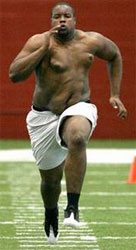Let me first say that I like and appreciate fish biologists. But at the same time, scientists from time to time study the obvious. Here’s one such example (imo) involving our largie friends – with some real doozies. Goes like this, from here – my comments at the end.
> In football, linebackers are usually the largest players and have the endurance required to get through a game plus overtime. But when it comes to fish, larger doesn’t always mean stronger. A University of Illinois study showed smaller fish recover from exertion faster than larger fish.
> “The point of the study was to replicate an angling situation where anglers catch and release [largemouth bass],” said researcher Cory Suski. “We wanted to know if large fish and small fish had similar physiological responses to being exercised and released, particularly regarding the time it takes the fish to recover from exercise.
> “What we found is that the large fish take longer to recover from exercise than the small fish do. None of the fish really experienced any major hardships, and they all survived easily, but the small fish recovered faster than the big fish.”
> “Big fish are reproductively valuable as they tend to have more babies than small fish,” he said. ” Big fish are also rarer than small fish, and they are more often targeted by anglers. If anglers are planning to release a large fish after catching it, the results from this study emphasize the importance of angling the fish for a short duration, handling the fish gently, and getting it back into the water quickly so that excessive disturbances are minimized and the fish can recover quickly, begin feeding, and get back to normal.”
> The fish in the study were caught in nets, put into dark tanks and allowed to rest. Later they were chased for 60 seconds to simulate angling and the amount of energy they might expend during a catch-and-release episode. Large largemouth bass exhibited elevated concentrations of plasma glucose and sodium relative to small fish following the exercise challenge.
> “Before we began the research, we predicted that the larger fish would respond and recover from exercise more quickly, providing another size-based advantage for larger fish, but we found the opposite to be true,” Suski said.
> Suski said anglers have always known that big fish are special, and the results of this study emphasize the need to treat big fish gently so they can be caught again in the future.
WTH?
Hokay, here goes:
> First of all, how would anyone who’s ever caught a fish think that bigger fish would recover faster than smaller fish?
> Fish have “babies?”
> So now we’re “exercising” fish when we catch ’em? Cool!
> When’s the last time you “angled” a fish? Does this involve body contortions?
> How do you chase a fish? And why not just catch ’em with a hook?
> Big fish are “rare” and “special?” (Hold on…I’m gonna cry….sniff)
And beyond all that:
> Do we really need another study that shows that the quicker you “angle” a fish and release it, the better?
> Last but not least: Who would ever think that linebackers are the largest players and therefore have the most endurance? Big basses are more like linemen – you know, the ones sucking from the O2 tanks on the sidelines. But maybe I’m not looking at it from the right…angle?


























Rich Arnold
September 23, 2011 at 3:14 pm
I bet if these guys studied the eating habits of larger largemouth, they would discover that they prefer to eat larger meals or “angling” baits. I know that is a stretch, but I believe these guys could prove that.
RichZ
September 25, 2011 at 9:55 pm
Uhm… I agree that big fish are more valuable. I really want to say that no-one is going to offer you 3 grand for a dink, but that would be mean, wouldn’t it?